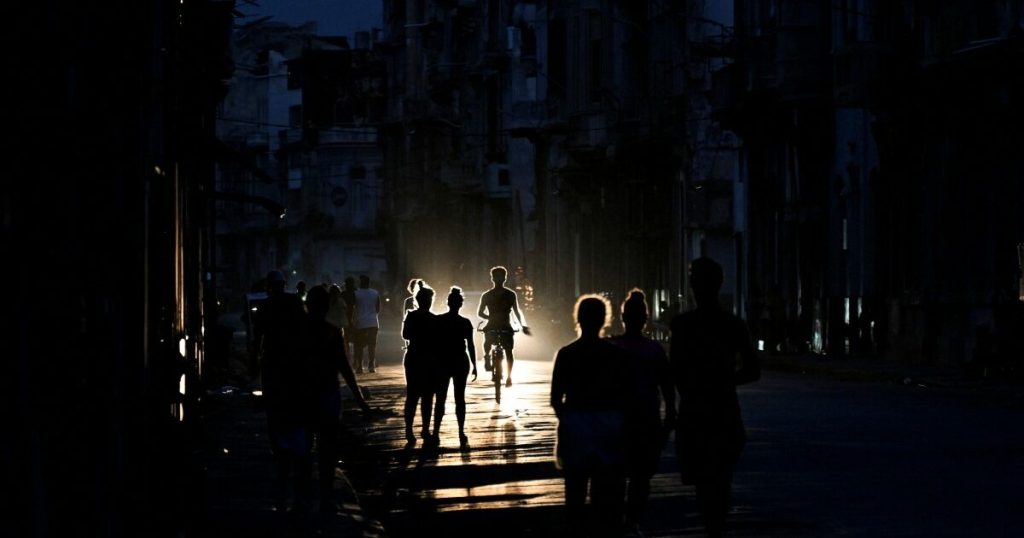The island nation of Cuba experienced a complete restoration of its electrical grid on Thursday, marking the end of a nationwide blackout that plunged the country into darkness for nearly 24 hours. This incident represents the fifth such widespread outage in less than a year, highlighting the persistent fragility of Cuba’s energy infrastructure and the ongoing challenges faced by its citizens. The blackout, which commenced on Wednesday morning, disrupted daily life for millions of Cubans, impacting work routines, school schedules, and access to essential services. The abrupt nature of the outage left many unprepared, forcing them to adjust to a life without electricity amidst already challenging economic circumstances. The eventual restoration of power brought a sense of relief, albeit tinged with the understanding that the underlying issues plaguing Cuba’s energy sector remain unresolved.
The recurring blackouts in Cuba are a stark manifestation of the country’s deep-seated economic woes. Years of economic hardship, exacerbated by the COVID-19 pandemic and the ongoing US trade embargo, have crippled the nation’s ability to maintain and upgrade its aging energy infrastructure. The country’s reliance on outdated thermoelectric plants, most of which were commissioned in the 1980s and 1990s, has created a system prone to breakdowns and inefficiencies. These aging plants are constantly operating at or beyond their intended capacity, making them susceptible to malfunctions that ripple through the entire grid. Furthermore, the lack of access to modern technology and replacement parts, largely due to the embargo, hinders the country’s ability to effectively address these technical challenges.
The Cuban government has attempted to mitigate the energy crisis through various measures, including renting floating power plants from Turkey and utilizing generators fueled by crude oil. However, these solutions have proven insufficient to address the systemic issues plaguing the energy sector. The financial constraints imposed by the economic crisis limit the country’s ability to invest in long-term solutions, forcing it to rely on temporary fixes that offer only limited relief. Moreover, the dependence on imported fuel for generators adds another layer of vulnerability, exposing the country to fluctuations in global oil prices and potential supply disruptions.
The latest blackout was triggered by a false overheating signal at the Antonio Guiteras thermoelectric plant in central Cuba, highlighting the interconnectedness and inherent vulnerability of the national grid. This single point of failure cascaded through the entire system, resulting in a complete shutdown of electricity supply across the island. The incident underscores the urgent need for investment in upgrading and diversifying Cuba’s energy sources to create a more resilient and reliable power grid. The ongoing struggle to maintain a stable electricity supply exacerbates the already challenging economic conditions faced by ordinary Cubans, adding to the strain on daily life and hindering economic activities.
The Cuban government has also embarked on a program to develop renewable energy sources, with a focus on solar power. The installation of 30 solar energy parks, part of a larger plan to establish 52 such parks with assistance from China, represents a positive step towards diversifying the country’s energy mix and reducing its reliance on fossil fuels. However, the impact of these initiatives has yet to be fully realized, and the country remains heavily dependent on its aging thermoelectric plants. While the long-term potential of renewable energy is promising, the immediate challenge is to stabilize the existing grid and ensure a consistent supply of electricity to meet the country’s current needs.
The recurring blackouts, coupled with widespread shortages of essential goods, high inflation, and low wages, have fueled growing social unrest in Cuba. Rare anti-government protests have erupted in recent years, reflecting the mounting frustration and desperation among the Cuban population. The economic hardships, exacerbated by the energy crisis, have created a precarious situation, placing immense strain on the daily lives of ordinary citizens. The struggle to access basic necessities, coupled with the uncertainty of the power supply, has created a climate of anxiety and discontent, posing significant challenges to the government’s ability to maintain social stability. The recurring blackouts serve as a potent symbol of the broader economic challenges facing the country, highlighting the urgent need for comprehensive reforms and investments to address the underlying systemic issues and improve the lives of the Cuban people.


